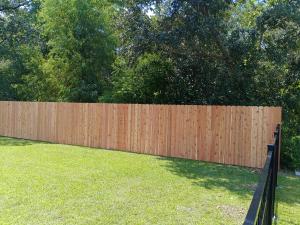Fence Failures Increasing Across Louisiana: Experts Point to Poor Installation and Low Standards
Tony’s Fencing and Iron Works shares the most common installation mistakes — and how their team builds fences that last in Southeast Louisiana’s climate.
COVINGTON, LA, UNITED STATES, November 17, 2025 /EINPresswire.com/ -- With fence replacements becoming increasingly common across Southeast Louisiana, Tony’s Fencing and Iron Works is drawing attention to a trend affecting property owners throughout the region: premature fence failure caused by poor installation practices.
The Covington-based company, known for over three decades of craftsmanship in custom wood, iron, vinyl, and farm fencing, is speaking out about the importance of professional standards and homeowner education in an often unregulated segment of the construction industry.
“We see more fences fall from poor installation than from storms,” said Tony, Owner of Tony’s Fencing and Iron Works. “Louisiana’s climate is harsh, but a fence that’s installed correctly should stand strong for decades. Too often, the problem is in the way it’s built, not the weather.”
The Hidden Problem Behind Early Fence Failure
In Louisiana, where humidity, storms, and soft soil are part of daily life, a properly built fence should last 15–25 years. Yet many homeowners find themselves facing costly repairs or replacements within five. The culprit, experts say, is not always material quality — but shortcuts made during installation.
Contractors trying to save time or reduce costs often set posts too shallow, skip concrete foundations, or use non-galvanized hardware that corrodes quickly. When drainage isn’t addressed, water collects at the base of posts, leading to premature rot or rust. Within a few seasons, the fence begins to lean, crack, or discolor.
“A fence is only as strong as the work behind it,” Tony explained. “When corners are cut, the homeowner ends up paying twice — once for the fence, and again when it fails.”
Why Quality Standards Matter
Unlike roofing or plumbing, residential fencing has few licensing or quality control requirements in many parishes. This lack of regulation means inexperienced or unqualified contractors can underbid jobs and deliver substandard work — a problem that has grown since the pandemic-era construction boom.
Tony’s Fencing and Iron Works emphasizes that professional standards are essential not only for longevity but also for safety. A poorly constructed fence can collapse under wind pressure, damage property lines, or fail to meet local code requirements. Automatic gates, in particular, pose unique safety risks if not installed to specification.
Industry standards like UL 325
help ensure that automatic gates and powered access systems are safe, durable, and compliant with national guidelines. Tony’s team supports wider awareness of such regulations among both contractors and homeowners.
Louisiana’s Unique Climate Demands Specialized Construction
The Gulf South’s environment is one of the toughest in the country for fencing. Constant humidity causes untreated wood to swell and shrink, while clay-heavy soil shifts with moisture changes. Without deep post setting, proper drainage, and corrosion-resistant materials, even high-quality fences can fail.
Professional builders like Tony’s Fencing adapt designs for these conditions. Posts are set deeper and reinforced with concrete to stabilize against movement. Galvanized and stainless-steel fasteners prevent rust, and air gaps at the base of panels allow moisture to escape. These practices ensure structural integrity while reducing long-term maintenance.
“Louisiana isn’t like other states,” Tony said. “Our soil moves, our air is wet, and our storms are strong. You can’t build a fence here like you would in Arizona or Tennessee — it has to be engineered for the South.”
A Call for Homeowner Education
Tony’s Fencing and Iron Works believes the best way to raise industry standards is through education and transparency. Homeowners who understand the basics of fence construction are better equipped to evaluate contractors and avoid costly mistakes.
Before hiring a fence company, experts recommend asking:
How deep will the posts be set?
What type of fasteners are used, and are they corrosion-resistant?
Will drainage or soil movement be accounted for in the design?
Is the company insured and experienced with local building codes?
These questions may seem simple, but they can reveal whether a contractor is building for long-term performance or just short-term profit.
“We’re not trying to sell more fences,” Tony added. “We’re trying to help people keep the ones they have standing longer. Knowledge protects homeowners just as much as the fence itself.”
Raising the Bar for Local Craftsmanship
While some national fence companies rely on prefabricated kits and one-size-fits-all templates, Louisiana’s diverse terrain requires custom solutions. Tony’s Fencing continues to advocate for craftsmanship that respects local soil, drainage, and wind load challenges.
By highlighting the consequences of poor workmanship, the company hopes to inspire other contractors to improve standards and homeowners to demand transparency in their projects. This educational initiative also reflects a growing trend in the construction industry toward sustainability and longevity — building once, building well, and building locally.
About Tony’s Fencing and Iron Works
Founded over 30 years ago, Tony’s Fencing and Iron Works is a family-owned company based in Covington, Louisiana. The firm specializes in custom wood, iron, vinyl, and farm fencing, as well as automatic gates, ADA-compliant handrails, and ornamental ironwork. Serving St. Tammany, Tangipahoa, Washington, and surrounding parishes, the company is committed to integrity, craftsmanship, and public education about fencing standards.
Media Contact
Tony’s Fencing and Iron Works
📍 Covington, Louisiana
📞 985-703-0595
🌐 https://tonysfencingandiron.com
Gwen M.
Designs For You
email us here
Visit us on social media:
Facebook
Legal Disclaimer:
EIN Presswire provides this news content "as is" without warranty of any kind. We do not accept any responsibility or liability for the accuracy, content, images, videos, licenses, completeness, legality, or reliability of the information contained in this article. If you have any complaints or copyright issues related to this article, kindly contact the author above.

